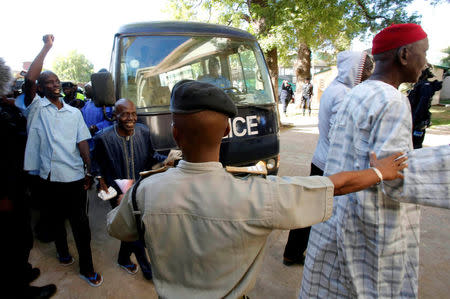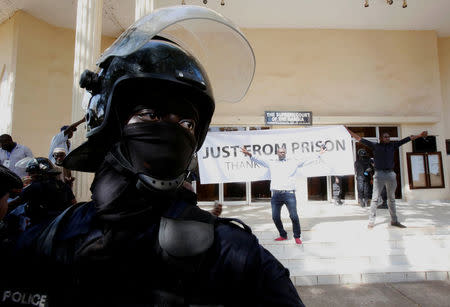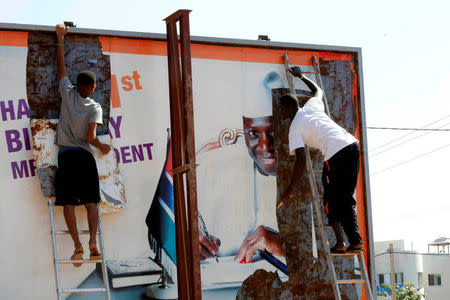Gambia court frees prominent lawyer, 18 others jailed for protest
By Emma Farge BANJUL (Reuters) - A Gambian court freed a prominent lawyer and 18 other political prisoners on bail on Monday pending an appeal of their jail term for "unlawful assembly", in a sign that President Yahya Jammeh's shock election defeat last week could end years of repression. A Reuters witness was present for the decision to release Ousainou Darboe along with other senior members of the United Democratic Party (UDP), who had been jailed for three years in July for taking part in a small protest near the capital Banjul. Darboe appeared thin in a long blue robe but grinned broadly as he hugged family members and friends in the courtroom. He was greeted by cheers and cries of "A new Gambia!" as riot police attempted to control a large crowd of supporters outside. Separately, 14 other political prisoners and Darboe supporters detained in May appeared before Gambia's High Court on Monday but the judge delayed a decision on their bail. Jammeh ruled Gambia for 22 years with an iron fist and little tolerance of dissent. Rights groups say the government routinely imprisoned and tortured political opponents. But his ouster at the ballot box, and his shock acceptance of his defeat despite previously saying he would rule for "a billion years", has raised hopes that democracy is dawning in the small, riverside West African nation of 1.8 million people. The election results gave Adama Barrow, a real estate developer who once worked as a security guard at retailer Argos in London, a clear win over Jammeh. Barrow has said he will free political prisoners. "It is finally time for the families of those people wrongly detained to be reunited with their loved ones," Amnesty International's Steve Cockburn said. "Adama Barrow has promised to release all political prisoners and he should ensure this goes beyond opposition figures and includes everyone jailed simply for expressing their views," he added. Darboe's wife Mymuna said she hoped for more, saying that the perpetrators of human rights abuses under Jammeh should have their turn in the docks. "People should face responsibility for their actions and all this killing and torture," she told Reuters. (Reporting by Emma Farge in Banjul and Nellie Peyton in Dakar; Writing by Tim Cocks; Editing by Richard Lough and Catherine Evans)



